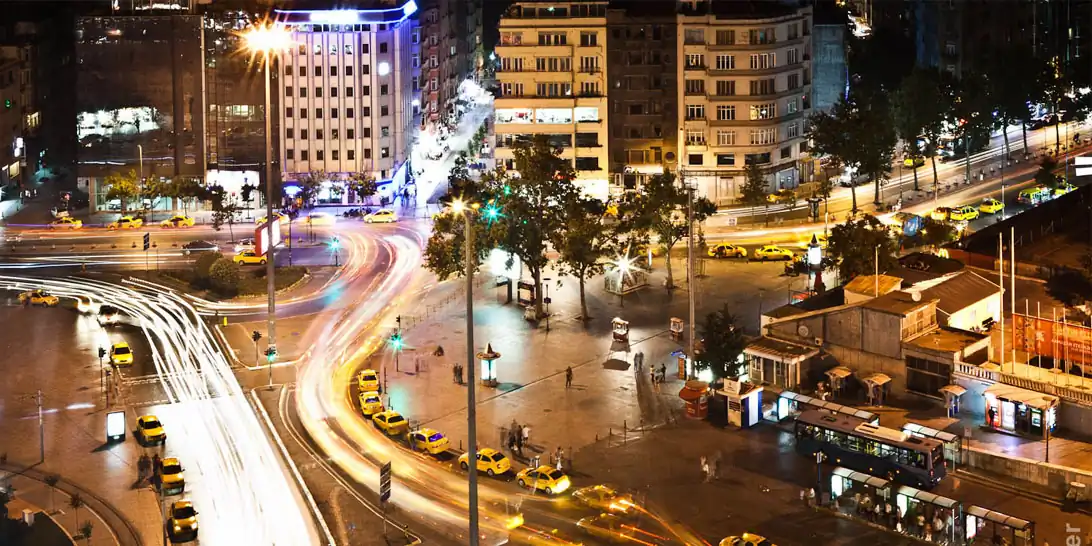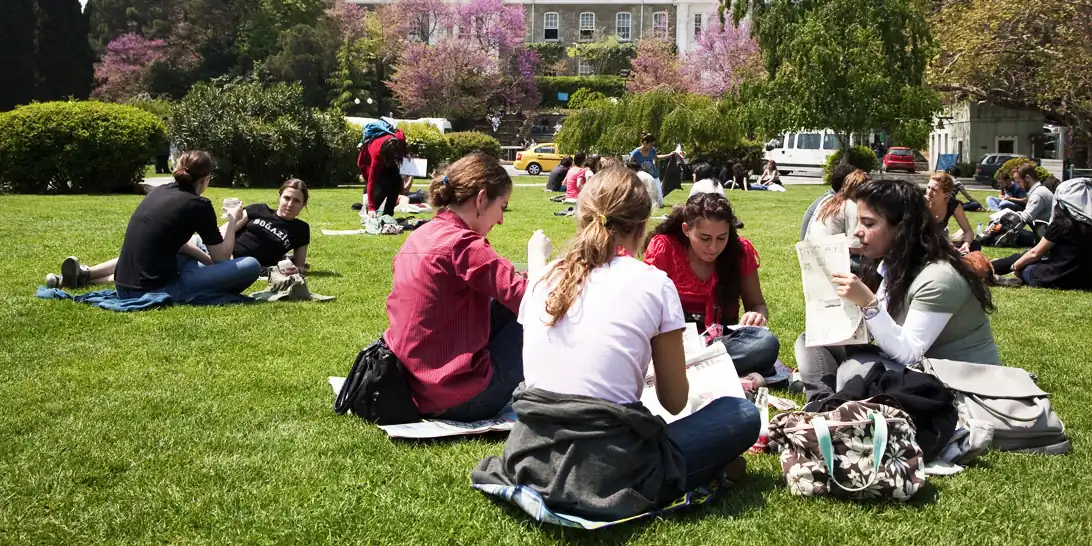Turkey is a great student destination if you want to experience a new culture and be close to both the East and West. Apart from the ideal mix between European and Oriental influence, Turkey also has a growing academic reputation with new and old universities working to offer international students’ competitive education.
Turkey has become one of the top destinations for international students, with the country offering outstanding opportunities for learning.

Turkey hosts many activities in terms of social and cultural life. Especially in those mega cities of Turkey such as İstanbul, Ankara and İzmir; Turkey has all types of opportunities for activities and there are many cities who host different events and activities in Turkey. You can use payphones at the airports to contact your family after arriving in Turkey. Do not hesitate to ask the airport personnel for more information. Please be advised that using the SIM cards of the mobile phones you bring from your country can be very expensive in Turkey. When you arrive in Turkey, you can use the phone cards sold in the PTT branches at the airport like YURTKART, Alo PLUS CARD, IPC, TTM, and VIP CARD.
It is more practical and cheaper to use mobile phone operators such as Turkcell, Türk Telekom and Vodafone in Turkey, all of which have English language services. Once you have decided which mobile operator to use, you can take up a contract or use the pre-paid option. You can get more information by visiting the branches of the Telecommunications operators.

Turkish culture in numerous ways characterizes a range that joins the past and present. Turks have inherited and developed vast understanding both from their eastern and western pasts. All these of these heritages, Eastern or Western, Asian or European can be found in modem Turkey. Today, Turkey embodies both Eastern and Western cultures in one incredibly diverse culture. Turkeys role on the world stage as an intermediary of cultures has never been more relevant or more promising. As in many countries eating is a significant part of social life in Turkey. No doubt, you are probably familiar with a range of popular Turkish foods such as kebabs, baklava or the appropriately named Turkish delight. Many of these began from dishes once served to the Ottoman sultans and their court. If you are familiar with the economical takeaway and mass-produced confectionary sold internationally, as Turkey's traditional dishes are often made to a much higher standard in the country itself. Traditional Turkish cuisine in all its regional selections, different types of food are extensively available such as fast-food and vegetarian. Turkish universities commonly have reasonably priced choices of good quality food services for students. Cafes and restaurants around the university are added options for eating out or you may prefer doing your own cooking.
All cities have an abundance of restaurants and cafes to eat in. Catering for specific dishes, such as kebabs, soups, wraps, pastries and seafood. While others offer an assortment of meals, including stews, rice, vegetables, and sweet deserts. International fast-food chains such as McDonalds and Burger King have recently become popular in major metropolitan areas. Both coffee and tea play a big part in Turkey’s social life. Tea and coffee houses are ideal meet up points, a place where people catch up to socialise with friends. In recent years, Turkish cafes have begun offering the traditional Hookah Pipes with many different flavours and aromas. This has once again ignited the popularity of Café Houses.

There are numerous methods to reach Turkey from anywhere in the world. The fastest and most cost-effective way is by flying. Public transportation is very handy. On offer are; buses, minibuses (dolmus), trains, ferry services and metro subways (in major cities). Students are eligible for discounts to use transportation both for interstate and city transportation. The public transport system in Turkey are conveniently located and reasonably priced.
The most common method of transport is a bus or coach for long trips of more than four hours across the country, while smaller road trips are regularly served by Dolmus (small minibuses).
Most residents choose a coach if they’re on a budget and traveling to see family especially when other modes of transportation aren’t available. What will surprise you is that the buses are very luxurious, of European standard, and the cost of a seat is surprisingly affordable.
Coach trips that normally take more than a couple of hours, you’ll be served with a snack or sandwich and a bottle of water for light refreshment at no extra cost. Some of the coach companies now provide wireless Internet, and the seats are extremely comfortable. There are frequent stops to use the bathroom and stretch your legs.
The main providers are Pamukkale, Metro, Kamil Koc and Varan, and booking can be done via the Internet, or in person at their branch office or by simply showing up and paying.
Dolmus travel is the easiest way to get from one place another when travelling locally. Signs of destinations are clearly marked on the front of the minibus, and the costs are located next to the driver on a card.

Turkish is the main language spoken by staff at public hospitals and clinics, while foreigners are more likely to find bilingual English-speaking professionals in private hospitals/clinics.
All universities in Turkey have some level of medical centres available for students to use. Having said that, it is recommended that international students to come to Turkey with a current health insurance policy. All international students in Turkey are eligible to receive
General Health Insurance to use the extensive health services provided by the state. Upon receiving your YKN number you can use services from the Health Insurance. Students with General Health Insurance will get free medical care from state hospitals by showing their YKN number. They are entitled to receive medication and prescriptions prescribed by the doctor from any pharmacy with only a minor fee. Pharmacies are accessible until 19:00 and some are be open all night as well. International students are accountable for the costs of hospitalization or for any medical service or treatment not available at university health centre. All hospitals have an emergency centre operating 24 hours a day, doctors and pharmacies are on call nights and weekends.
Pharmacies are called Eczane in Turkish and are located all over the country. Large cities such as Istanbul and Ankara usually have many of 24-hour pharmacies, generally pharmacy hours are until 19:00. Pharmacists in Turkey are very experienced and can usually diagnose illnesses, offer over the counter medications and they will suggest for you to see a doctor if required.
In the event of an emergency, you should dial 112 to speak to an operator that can put you through to the relevant service. Ambulances in Turkey are up-to-date and fully equipped to deal with numerous situations, equipped with the health sector’s latest technology.
The YKN Number (Foreign ID Number) is an exclusive number of eleven digits issued by the General Directorate of Population and Citizenship Affairs (Nüfus ve Vatandașlık İșleri Genel Müdürlüğü) to foreigners who have obtained a foreigner’s residence permit in Turkey for a minimum of three (3) months for any purpose. With this ID, you can benefit from health services during your study, register for examinations held by ÖSYM, and open bank accounts. Your unique YKN number will be provided to you after your residence permit is issued.

Be prepared to enjoy a new culture and social environment while in Turkey. Turkey has on offer a great opportunity for international students to a high-quality education, but it doesn’t end there. Turkey boasts many historical attractions, rich in history and cultural diversity. Music both modern and traditional concerts are on offer plus there are constant exhibitions and festivals to entertain you and immerse you in Turkish culture
Understandably, coming to a new country can be overwhelming, the warm welcoming and friendly social environment will make you feel at home in no time. Understanding that studying in Turkey and receiving a high-quality education being surrounded by rich history and cultural diversity plus exploring a new culture will make your study so much smoother especially while you prepare for your future.
Turkey in recent years have developed shopping malls both in major cities and towns that match if not surpass shopping malls found all over the world. These include brand-name stores within the malls and massive car parks. These shopping malls great places to shop for clothes, furniture and household goods all in one place.
Most also include stores of the larger supermarkets. Most also have bookstores with foreign books as well as large food halls to have a bite in. They even provide wireless internet services. Most have banks and ATM’s as well as movie cinemas. Additionally, local and international students are eligible for discounts provided by public transportation, restaurants, cinemas, museums, bookstores, shops and many others. Discounts may range between 10% to 50%.
International students are encouraged to join one or more of the many social clubs and student associations available at the school to enhance their social life. This gorgeous country offers four specific seasons, these seasons allow for you partake in outdoor sporting activities, such as swimming (scuba diving and snorkelling), white water rafting, sailing, water skiing. Soccer, basketball, volleyball, cycling, jogging, yoga and Thai-chi. There are many sporting and recreational activities you can choose from.

People are very open, direct and easy. The students in Turkey are also very cosmopolitan. In general, they are very accepting, warm, lively, and kind natured. Every year the universities organize opening festivals and spring festivals and rock or hip-hop concerts, sports competitions, etc. There are numerous offers made in various traditional student clubs and teams are always looking for new. Studying in Turkey is not just about studying and rummaging through books. Many students prefer water sports, hiking, camping, volleyball, basketball, American football and of course the craze in Turkey is football/Soccer.
Beyond that a lot of reputable clubs that organize international and national conferences, e.g. United Nations clubs, medical clubs or evolutionary biology clubs, etc.
Living outside of campus is more cost effective than EU countries, so many moves into a shared apartment or as individuals in an apartment. Rents vary, but one can say that Istanbul is still one of the most expensive cities in Turkey.
Around the universities are numerous cafes, restaurants, pubs, stationary/copy shops, et Students do not always have to go to the big city jungle to do something. Everything is easily accessible.
Almost all faculties are usually located in or around the campus. In a nutshell, the Turkish University itself is a small city in the city.
 For ambulance, dial 112
For ambulance, dial 112
 For police, dial 155
For police, dial 155
 For fire brigade, dial 110
For fire brigade, dial 110
To do this, you must first register into the  system. After selecting the desired program from the system, firstly, you need to enter your personal information into the system. You must upload your documents and information of the undergraduate or graduate program which you have completed to the system. After uploading all your information to the system, your documents will be examined by the public authority and the e-mail address will be sent to the e-mail address registered in the system. You can review the doctoral programs from the button below;
system. After selecting the desired program from the system, firstly, you need to enter your personal information into the system. You must upload your documents and information of the undergraduate or graduate program which you have completed to the system. After uploading all your information to the system, your documents will be examined by the public authority and the e-mail address will be sent to the e-mail address registered in the system. You can review the doctoral programs from the button below;
There are countless reasons to study in Turkey. Turkey has become a centre of attraction for students around the world, with its beautiful nature, spiritual mosques and historical architecture, great transportation system and unique characteristics specific to its cities.
Turkey has become one of the top destinations for international students, with the country offering excellent opportunities in education. Turkey has become a popular choice and destination for many students from around the world due to the high standard of education coupled with low tuition fees offered by many Turkish universities.
The Republic of Turkey has witnessed various civilizations throughout its history, carrying a unique cultural heritage that has been enriched by achievements from both the Eastern and the Western. The tradition of higher education, which is one of the reflections of its history. Turkey is truly a land unto its own - with a young, dynamic population living amongst the remains of ancient civilizations,

where both natural and financial resources have flowed along the famous routes of the Silk Road. Travelers throughout history have long been attracted to the country’s charm and rich cultural diversity, in recent years they have also come to capitalise in its economic successes.
Turkey plays a major role in the global economy and international trade, standing out as a promising emerging market alongside the likes of Brazil, Russia, India and China.This status is supported by its robust local market and young population.As an international student in Turkey you will have the opportunity to experience both modern and old customs in one of the safest and most exciting countries in the region. Some Turkish Universities have English as the teaching language while provide the opportunity to learn English. Most importantly, the high quality of education on offer will prepare you for a future anywhere in the world.
Geographically Located between the Europe and Asia, the Turkish landscape includes a vast variety of geographical regions, it has the collective characteristics of three continents of the world: Europe, Africa and Asia. Due to its geolocation, bordered by seas on three sides, Turkey has always been the centre of trade for the silk and spice routes. Even now, one can notice the traces of different cultures that have occupied this last for thousands of years.
Higher education in Turkey, with the quantitative growth it has exhibited in recent years, consisting of universities with associate’s, bachelor’s, master’s and doctoral degree programs, faculties, institutions, conservatories and vocational schools. Higher Education has demonstrated substantial progress in many areas, especially in access to higher education. As of Today, more than 8 million students, 206 of 129 universities are state universities, 77 are private and foundation universities. According to data recorded in recent years,
Higher education institutions comprise over 160 thousand lecturers in higher education sector of Turkey. In Turkey, the higher education institutes provide at least two years of higher education and offer students; associate's, bachelor's, master's or doctorate degree levels. Institutions of higher education consist of universities, faculties, institutes, schools of higher education, conservatories, vocational schools of higher education and application-research centres.
Each higher education institution has prerequisites to issue directives or regulations to define admission requirements for international students by including recognized national and international exams and/or their own entrance examinations, minimum exam scores and grade point of average requirements.

Turkey is the most prominent country in European Higher Education in terms of the number of students.
Turkish universities offer high level specific courses in a variety of fields for students who have completed secondary education. The Intensification of higher education is to have students prepared for globalizing world, in terms of both quality and quantity, has been adopted as the primary goal. The plans and programs made have always reflected this perception. Universities comprising several units are established by the state and by law as public corporations having autonomy in teaching and research. Furthermore, institutions of higher education, under the supervision and control of the state, can also be established by private foundations in accordance with procedures and principles set forth in the law provided that they are non-profit in nature. As in many other parts of the world University are the principal higher education institution in Turkey. Possessing academic autonomy and a public legal personality. They are responsible for carrying out high level educational activities, scientific research and publications. Each university consists of faculties and four-year schools, offering bachelor's level programs, the latter with a vocational emphasis, and two-year vocational schools offering pre-bachelor's (associate's) level programs of a strictly vocational nature.
Graduate-level programs consist of master's and doctoral programs, coordinated by institutes for graduate studies. Master's programs are specified as "with thesis" or "without thesis" programs, both at a minimum of two years. "With thesis" master's programs consist of a specified course completion followed by a submission of a thesis whereas "without thesis" programs consist of completion of graduate courses and a term project. Access to doctoral programs requires a master's degree. Doctoral programs have a duration of at least four years which consists of the completion of courses, passing doctoral qualifying examination, and preparing and presenting a doctoral thesis. Medical specialty training programs equivalent to doctoral level programs are, however, carried out within the faculties of medicine and the training hospitals owned by the Ministry of Health and the State Social Insurance Organization. Universities are free to determine the number of students to be admitted to their graduate-level programs, as well as admission requirements, and the curricula and degree requirements of such programs, in line with the general rules and regulations adopted by the Inter University Council.
206 Universities
Turkey is one of the cost-effective countries to live and study. Studying in Turkey is relatively economical compared to other countries with the same level of education.
The applicants who want to study in any undergraduate programs should apply directly to the university. Each university accepts international students on the basis of their own requirements that are published on their official websites.
Graduate programs in Turkey include Masters, PhD and specialization in medicine programs. which are carried out through institutions.
Turkey is in great change in the area of higher education with the enhancing numbers of universities, research centres, academicians and with its dimensions of internationalization.
In the last 10 years, the number of international students studying in our higher education institutions have increased by 75% and according to current figures, our country became one of the most international student welcoming countries in the world with approximately 150 thousand international students, and 17 thousand of which were scholarship students.
Turkey has a goal to host 200 thousand international students by 2023. The the number of students studying in a country other than their home country was 800 thousand in 1975, this number now has reached to over 4 and a half million in 2010. It is estimated that this number has reached 7.5 million today and is expected to hit 20 million by 2030. On the other hand, the number of students enrolled in a higher education program internationally has also increasing rapidly. While the number of students enrolled in any higher education institution in the world in 2009 was 170 million, it is estimated that this number will reach 262 million in 2025.
As far as countries are concerned, many countries around the world today have made international student mobility a topic of competition and use it as a tool to provide benefits to their economy, culture, academia and many other areas. Our country regards the opportunities in this area as very important, especially in terms of establishing mutual relations with other countries. The Turkish education system offers international students a rich field of choices. You will find numerous options to choose from, from specialized degrees to unique programs geared toward international students’ aspirations in the forever changing global education landscape.

Turkey's internationalization efforts in higher education is basically based on the following four principles:
A Global Cooperation Vision Base on Higher Education
Contributing to international student mobility in the region surrounding Turkey and around the world, Turkey believes that education-oriented relations between countries can lead to long-lasting friendships.
Diploma and course contents of the previously completed degrees, letter of reference and statement of purpose are required in the application procedures of the graduate programs Students who graduated in Turkey must submit Graduate Entrance Exam’s (ALES) result in addition to the given documents. English-medium universities can ask for additional exam results such as TOEFL, GRE or GMAT which have international validity. Each university and program may have different admission criteria. Therefore, those who wants to have graduate education has to apply directly to the institutions of the universities.
Two types of master degrees as masters with thesis and non-thesis programs are offered for students. Whereas master’s programs with thesis consist of at least seven courses, one seminar and a thesis study. non-thesis master programs contain at least ten courses and a semester project. The required period to complete the master degree is 2 years.
Doctorate programs have at least seven courses on offer, proficiency exam and a thesis. The period to complete the courses are four semesters at most and the period to finish the doctorate program is eight semesters. To be able to apply for doctorate programs, it is a requirement to have a master’s degree. The applicants can apply with their undergraduate diploma to the joint doctorate programs which consists of both master and doctorate education.
The applicants must prove their efficiency in the universities’ course language which is usually in Turkish (Also in provided in English, French and German). The students, who are accepted to university but not able to get the efficiency score in the required language, are given language course for a year. Also, Turkish lessons are given to international students.
Universities in Turkey run on a two-semester system, known as fall and spring semesters. Some universities additionally have summer school programs.
Academic performances at the universities are determined on perormance and attendance. Universities test students’ academic success with different examinations such as two midterm and one final or one midterm and one final. Some universities implement different systems such as make-up exams or summer schools. In addition to exams, various Homework and reports are efficient in taking grades. Pass-marks in the universities are usually 60/100 (2.00/4.00) (These grades may differ among universities).
Most campus universities offer a variety of accommodation facilities or other options. Apart from university dormitories, state owned dormitories are available for all students. Students are encouraged to contact the university to find out more about their specific options. Large cities sometimes also offer rental accommodation, often shared with other international or Turkish students.
Most of the dormitories have kitchen supplies to so students can cook their own meals, they also have small cafeterias which serve until midnight. Dormitories are separated by gender and offer both private and shared rooms. Living in a dormitory is a great opportunity to be involved in on- and off-campus activities as well as meeting lots of other students, a great way to make friends for an international student. Average room prices vary between $ 30 and $ 300 per month depending on facilities.
If you don’t want to stay in a dormitory, there are other choices ranging from luxurious residents to moderate and smaller apartments. There are many options available for students to choose. We suggest that until you get to know your school and the city that you will be staying, it is better for you to stay in a dormitory. We would like to inform that the standards of the state-run dormitories, which serve throughout the year including semesters and summer holiday, have risen notably in recent years.
But, if you still want to rent a house, the shortest way is to do some research on internet or get in touch with a real estate agency in your neighbourhood. If you have extra time, it is also possible to find a house by wandering around and looking for a house to rent. When you rent a house via an agency, you should prepare to pay one-months rent as an agency commission. Also, be aware that you will be expected to pay a deposit whether you are renting the house directly or through an agency. The amount of the deposit is equal to one-month’s rent. However, at the end of the tenancy contract, when you vacate the house, the deposit you paid will be given back to you.
It is also possible to find a house, which is heated with coal, natural gas or fuel-oil preferably. Besides, you can also prefer a house with central or apartment heating. We recommend that you apply for your house’s utilities such as natural gas, electricity and water systems. Don’t forget to cancel your accounts when your rental contract is over.
Dormitories: In Turkey, there are campus as well as state dormitories for students. All the necessary facilities are provided to students in these dorms. The university dormitories are managed by the university management office. Students must contact the respective university’s management office to find out about the procedure and rules of the dormitories. Dormitories are segregated by gender. There are single, double and quadruple rooms available for students. The undergraduate and graduate students are given access to the university dormitories.
OFF-CAMPUS RENTING: In the major cities, off-campus apartments prices quite high, but the prices also vary a lot with certain districts, size and quality. The solution for many students is to share apartment with a friend or fellow student. Average cost of an apartment off campus ranges between $200 and $500/ month.
Living expenses for international students generally go upwards from 300 to 400 US dollars per month depending on the living standards you choose. Books and administrative fees are approximately 100 to 150 US dollars per semester.
Turkey is a great student destination if you want to experience a new culture and be close to both the East and West. Apart from the ideal mix between European and Oriental influence, Turkey also has a growing academic reputation with new and old universities working to offer international students’ competitive education.
People are very open, direct and easy. The students in Turkey are also very cosmopolitan. In general, they are very accepting, warm, lively, and kind natured. Every year the universities organize opening festivals and spring festivals and rock or hip-hop concerts, sports competitions, etc. There are numerous offers made in various traditional student clubs and teams are always looking for new. Studying in Turkey is not just about studying and rummaging through books. Many students prefer water sports, hiking, camping, volleyball, basketball, American football and of course the craze in Turkey is People are very open, direct and easy. The students in Turkey are also very cosmopolitan. In general, they are very accepting, warm, lively, and kind natured. Every year the universities organize opening festivals and spring festivals and rock or hip-hop concerts, sports competitions, etc. There are numerous offers made in various traditional student clubs and teams are always looking for new. Studying in Turkey is not just about studying and rummaging through books. Many students prefer water sports, hiking, camping, volleyball, basketball, American football and of course the craze in Turkey is football/Soccer.
Beyond that a lot of reputable clubs that organize international and national conferences, e.g. United Nations clubs, medical clubs or evolutionary biology clubs, etc.
Living outside of campus is more cost effective than EU countries, so many moves into a shared apartment or as individuals in an apartment. Rents vary, but one can say that Istanbul is still one of the most expensive cities in Turkey.
Around the universities are numerous cafes, restaurants, pubs, stationary/copy shops, et Students do not always have to go to the big city jungle to do something. Everything is easily accessible.
Almost all faculties are usually located in or around the campus. In a nutshell, the Turkish University itself is a small city in the city.
Bank accounts have become an essential necessity for individuals everywhere around the world, because of the services and benefits they help individuals in managing their financial affairs with ease. One of the most important things that residents and investors require when they come to Turkey is opening up a bank account to deposit their money and use the services Banks provider.
Opening a bank account is one of the necessities to meet the demands of modern life but when you have moved to a foreign country it becomes a daunting task. You can utilise banks to pay fees, such as university fees, rental accommodation, all purchases, bill payments, Currency exchange, in addition adopting the banks applications such smart device applications, making it easier to do your banking without the need to visit bank physically.

Banks in Turkey provide you with full foreign currency and Turkish Lira services, including deposits and saving accounts, credit cards, debit cards and fast money transfer to any bank in the world. You will be able to process your banking transactions via internet or by telephone banking, both of which have English speaking customer service representatives.
Banks can exchange foreign currency, but unfortunately charge a commission. Many foreign exchange bureaux change foreign currencies more quickly and usually for better rates than the banks. Please be mindful that traveller cheques, bank checks or Euro-cheques are challenging to cash in Turkey.
Most of the main banks have branches in all the Turkish cities and towns, in almost every district. Most also have Automated Teller Machines (ATM). All the ATMS’s have multilingual instructions for usage.
To open a bank account in Turkey, you will be requested to provide the following documentation when you visit a branch:
Accounts are approved on the very same day, and access to your telephone banking and online internet banking services are activated shortly afterwards. Turkish online banking systems are highly sophisticated and safe. Before a bank account can be opened in Turkey for international students, most of the banks will require a Turkish mobile phone number to send a text message to confirmation. Most of the banks' internet sites in Turkey support English language, some also support Arabic and other languages are available depending on the bank.

All international students, regardless of their status, must register and obtain a Residence Permit (Ikamet Tezkeresi) from the Istanbul Provincial Immigration Administration Office within 10 days of entering Turkey. You are required at all times to present your Residence Permit upon request. Student Residence Permits are issued to undergraduates, Master’s and PhD students. A Research Residence Permit is specifically issued to students with a research scholarship. After completing your university enrolment, please visit the web page https://e-ikamet.goc.gov.tr and via the "I lodge and application for residence permit for the first time" section submit your residence permit application with the required documents to obtain a residence permit.

International students who enter Turkey with a student visa need to submit their residence permit requests to the Directorate General of Migration Management within 30 days after entry.
Student Residence Permits are issued with an expiration of three years for undergraduate students, two years for Master’s students and four years for PhD students. For students who are studying the mandatory Turkish Preparation Course, a residence permit of one year is issued initially, which can be extended later in accordance with the duration of further education you embark on. In the event that your residence permit or passport is lost, please immediately report to authorities for the replacement of your documents within 15 days. Students who change university or their residence address need to notify these changes both the new and old to local security authorities of the respective institutions within 48 hours.
Your YKN Number (Foreign ID Number) is a unique number of eleven digits issued by the General Directorate of Population and Citizenship Affairs (Nüfus ve Vatandașlık İșleri Genel Müdürlüğü) to foreigners who obtain a foreigner’s residence permit in Turkey for a minimum of three (3)

months for any purpose. With this document, you can benefit from health services during your study, register for examinations held by ÖSYM (The Measuring, Selection and Placement Center (Ölçme, Seçme ve Yerleştirme Merkezi, ÖSYM) is the body responsible for organizing the national level university entrance examination Student Selection and Placement System) The YKN Number can be used to open bank accounts. Your unique YKN number will be assigned after your residence permit is issued.


Turkey is now accepting Turkish Government Scholarship applications from international students around the world. Türkiye Scholarships for International Students are now underway and it is certainly a great time for students. The country has opened its doors to students from around the world and is encouraging them to study at their prestigious Turkish universities. This is certainly an amazing opportunity for students. With the help of such scholarships, you will be able to study at some of the best universities in Turkey and gain very useful insight, skills, and research. All of these things will prove to be extremely useful as you move on with your career and go into a more demanding phase.
International students who want to study in Turkey have the opportunity to benefit from a Turkish Scholarship program which includes university placement, tuition fee, accommodation, monthly allowance, and a once-off flight ticket for successful applicants. Students who meet the stringent requirements will enjoy these benefits. Türkiye Scholarships is a government-funded program, it’s a very competitive scholarship program, granted to exceptional students to pursue full-time or short-term program at the top universities in Turkey. Applications will be open to prospective students who wish to study at bachelor’s, master’s and doctoral levels.
Turkey welcomes international students from all around the world with “Türkiye Scholarships”. The scholarship program provides its prospective students with an array of education opportunities in the most respected Turkish universities, helping students achieve new perspectives and have an exceptional educational experience during their study in Turkey.
Türkiye Scholarships is a government-funded, highly competitive scholarship program, granted to outstanding students whom wish to pursue full-time or short-term programs at the top universities in Turkey.
Apart from providing education opportunities at international standards as well as providing a wealth of knowledge and experience, Turkey offers scholarships to international students from all over the world to study in the most recognised universities in Turkey.
Cover in Bachelors/Masters/PhD Degree>
All applications are reviewed based on basic criteria such as minimum academic grades, age limit, required documents etc.
Applications of eligible candidates are carefully reviewed by Expert committees based on a broad set of criteria including academic standing, previous qualifications, academic interests, career goals, consistency of choices, clarity of letter of intent, participation in social activities ...etc. After which a list of qualified candidates is shortlisted for interviews.
The shortlisted candidates are interviewed in more than 100 countries by interview committees including academicians and experts. Interviews usually last 15-30 minutes and are conducted in the following format:
Please note that the interview is not indicative of whether the candidate will be selected or not.
Note:: Candidates who are selected for interviews must bring all transcripts, documents and certificates of each year they have studied if they have not graduated yet.
Interview results of candidates nominated by the interview committees are evaluated by a selection committee and a list of candidates to be awarded a scholarship are formed. This final evaluation stage will assess the overall eligibility and suitability of the candidate for Türkiye Scholarships.
Applications can only be made individually through Official Scholarship Website www.turkiyeburslari.gov.tr by the candidates. There are no institutions or persons authorized to apply for Türkiye Scholarships.
Candidates applying at Bachelor’s, Master’s and PhD (also, Research applicants) levels are welcome to apply between January – February every each year.
You can check for detailed information and application: Apply Now